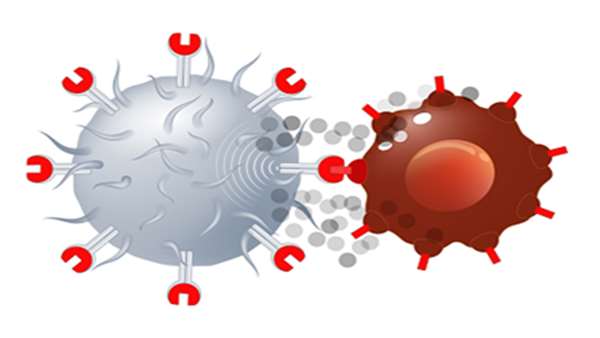In a breakthrough for the treatment of aggressive solid cancers, researchers at Children's Hospital of Philadelphia (CHOP) have developed a novel cancer therapy that targets proteins inside cancer cells that are essential for tumor growth and survival but have been historically impossible to reach. Using the power of large data sets and advanced computational approaches, the researchers were able to identify peptides that are presented on the surface of tumor cells and can be targeted with "peptide-centric" chimeric antigen receptors (PC-CARs), a new class of engineered T cells, stimulating an immune response that eradicates tumors.
The discovery, which was described today in Nature, opens the door to treating a broader array of cancers with immunotherapy as well as applying each therapy across a greater proportion of the population.
"This research is extremely exciting because it raises the possibility of targeting very specific tumor molecules, expanding both the cancers that can be treated with immunotherapy and the patient population who can benefit," said Mark Yarmarkovich, PhD, an investigator in the Maris Laboratory at Children's Hospital of Philadelphia and first author of the paper. "By using a multi-omics approach, we were able to identify peptides specific to neuroblastoma tumors, but this method could be used in any cancer, allowing for a more personalized approach to cancer treatment."
The development of CAR T cell-based cancer immunotherapy marked a breakthrough in the treatment of leukemia, but the approach has not yet made significant strides against solid tumors due, at least in part, to a lack of tumor-specific targets. In these cancers, most of the proteins responsible for tumor growth and survival are in the nuclei of tumor cells, not on the cell surface, where they would generally be accessible to CAR T cells. Instead, fragments of these proteins may be presented on the tumor cell surface through the presentation of peptides on the major histocompatibility complex (MHC), which evolved to present viral and bacterial peptides to the immune system. Cancer cells can also present intracellular proteins on MHC, and if these are mutant peptides, they may be recognized as foreign. However, all pediatric cancers and many adult malignancies have few mutations and are rather driven by other factors like dysregulated developmental pathways.
Neuroblastoma is an explosively aggressive pediatric cancer that is driven by modifications of gene expression that promote uncontrolled tumor growth. Historically, neuroblastoma has been treated with chemotherapy, surgery, and radiation therapy, but patients often relapse with forms of the disease that are chemotherapy resistant. Additionally, the low mutational burden of the cancer, combined with its low MHC expression, have made it difficult to target with immunotherapies.
Despite these obstacles, the researchers hypothesized that some of the peptides presented on the surface of neuroblastoma tumor cells come from proteins that are essential for tumor growth and survival and could be targeted with synthetic CARs. These PC-CARs would allow for direct targeting and killing of tumor cells. The challenge was differentiating tumor-specific peptides from other, similar looking peptides or peptides that exist in normal tissues to avoid cross-reactivity and lethal toxicity.
To do so, the researchers stripped the MHC molecules off neuroblastoma cells and determined which peptides were present and at what abundance. They used a large genomic dataset that the Maris lab has generated to determine which peptides were unique to neuroblastoma and not expressed by normal tissues. They prioritized peptides that were derived from genes essential to the tumor and had characteristics required to engage the immune system. To weed out any potential antigens that might have cross reactivity with normal tissue, the researchers filtered the remaining tumor peptides against a database of MHC peptides on normal tissues, removing any peptide with a parent gene represented in normal tissue.
Using this multi-omics approach, the researchers pinpointed an unmutated neuroblastoma peptide that is derived from PHOX2B, a neuroblastoma dependency gene and transcriptional regulator that was previously identified and characterized at CHOP. The next major hurdle was developing a PC-CAR that specifically recognized just the peptide, which makes up 2-3% of the peptide-MHC complex. In collaboration with antibody-discovery company Myrio Therapeutics, the researchers developed a PC-CAR targeting this peptide and showed that these PC-CARs recognized the tumor-specific peptide on different HLA types, meaning the treatment could be applied to patients of diverse genetic lineages.
Taking the research a step further, the team tested the PC-CARs in mice and found that the treatment led to complete and targeted elimination of neuroblastoma tumors.
"We are excited about this work because it allows us to now go after essential cancer drivers that have been considered 'undruggable' in the past. We think that PC-CARS have the potential to vastly expand the pool of immunotherapies and significantly widen the population of eligible patients," said senior author John M. Maris, MD, pediatric oncologist and Giulio D'Angio Chair in Neuroblastoma Research at CHOP. "Thanks to the Acceleration grant we received through the Cell and Gene Therapy Collaborative at CHOP, we will bring our PHOX2B PC-CAR to a clinical trial at CHOP in late 2022 or early 2023."
Ref:https://www.sciencedaily.com/releases/2021/11/211103135824.htm




ارسال به دوستان